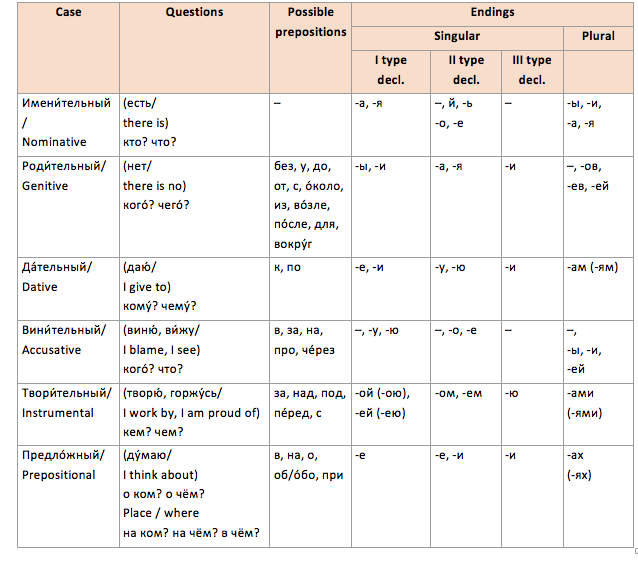
Russian Cases Conjugate Russian Nouns by Cases Like a Pro!
( 1) Have you ever found yourself sobbing over the chart of Russian cases, crying over prepositions and endings? If the answer is "yes", this blog post is for you! You got it right - this is the beginning of a new series entirely dedicated to Russian grammar cases.

Russian Cases in Simple Words (with visual sheets, charts, video) Russian language lessons
Below are the six grammatical cases in Russian, which determine the last one or two letters of a noun. Each case form clearly shows the function of the noun in a given sentence. We'll discuss each one and its impact on declension below. Nominative Case. The nominative case dictates that the noun is the main subject of the verb in the sentence.

Russian Nouns in Plural Nouns in plural usually have the following endings и or ы (for
Russian Learners' Dictionary: 10,000 Russian Words in Frequency Order - A simple but powerful concept. Expand your vocabulary by learning the most used words first. The nominative case is used in Russian to represent the subject of a sentence. The nominative case is the dictionary form of a word. Learn Russian grammar with our free lessons.
Russian nouns list
1) NOMINATIVE Nominative form is the most basic version of any noun, adjective, or pronoun in Russian. It's the way words appear in the dictionary. We use this case to identify the subject of a sentence. Example: Анна очень умная. Anna ochen' umnaya. Anna is very smart. Who is very smart? Anna. Anna answers the nominative question Kто/Kto/Who?
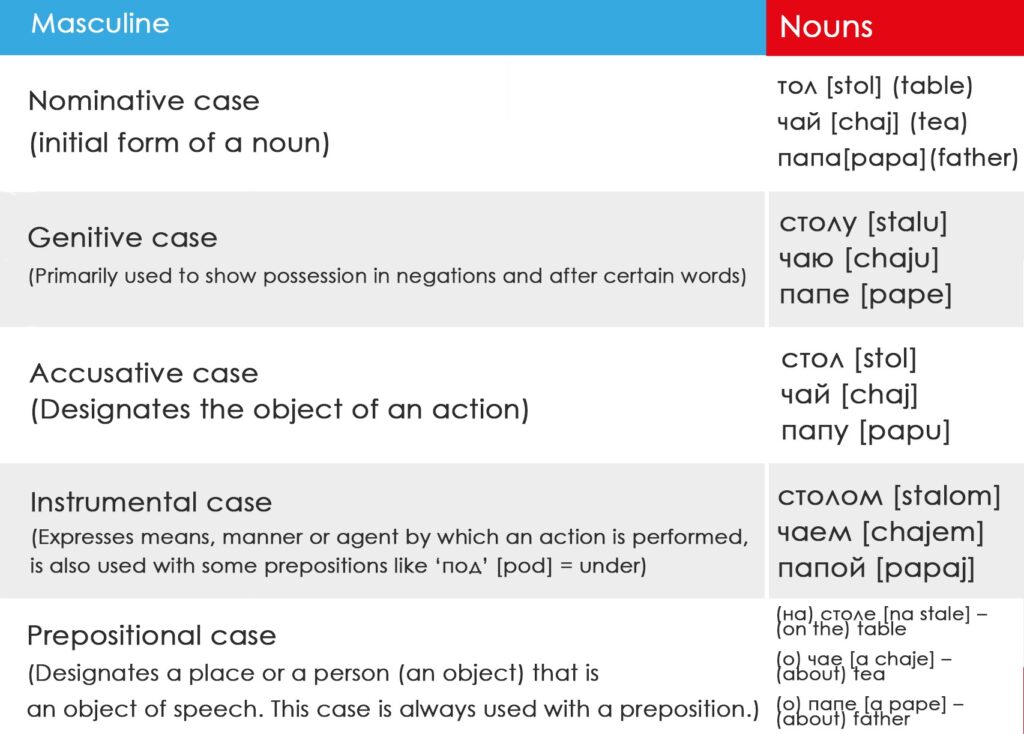
Russian grammar 101 LingQ Language Learning Blog
In Russian, there are six cases: Nominative case (именительный падеж): The subject of the sentence Accusative case (винительный падеж): The direct object of the sentence that is the recipient of the verb Genitive case (родительный падеж): Indicates ownership or attribution, i.e. "of", "whose"

Learn the 6 Russian Cases Fast with this Proven System
RUSSIAN CASES. Everything is good in its season, and if you are reading this page now it is definitely the right time for you to become an expert in Russian language cases. We introduce you to the Russian case system with detailed explanations on rules and exceptions.With our consolidated data you will feel confident in declension of Russian nouns, adjectives and pronouns soon!
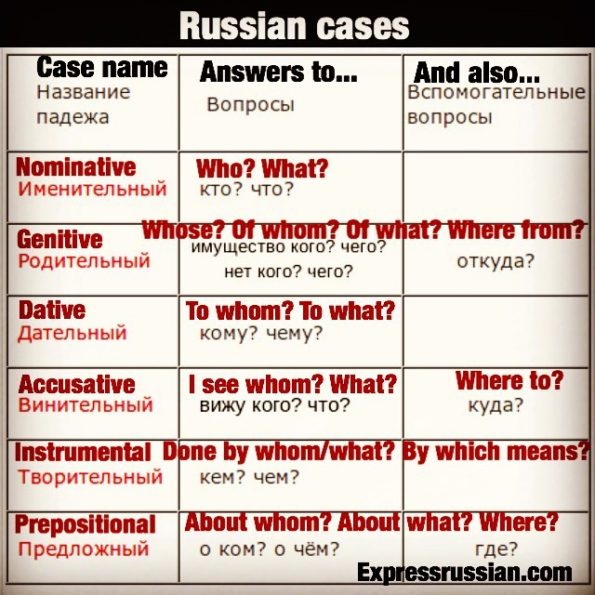
Russian Cases Conjugate Russian Nouns by Cases Like a Pro!
There are 6 cases in Russian: Nominative case in Russian (именительный) It is the simplest case in the Russian language, as words do not conjugate - they have the same form and endings as in the dictionary, this is the initial form. In Nominative, a noun is the subject of the sentence. Вот (here is), это (this is) are followed by nouns in Nom.Case.

Personal Pronouns in all 6 cases russian
2. Tables of Russian adjectives. Russian adjectives agree with the noun in gender, number and case. In our course on Russian cases we have created two lessons for each grammatical case: a one lesson for nouns and one lesson for adjectives. In the tables below you can see the different endings of Russian adjectives for each case.

How to learn Russian cases. The Best visual sheets, charts about Russian cases. [toc] What is
Plurals - Russian Dative Case. Look at the last letter nominative singular form (dictionary form) and. 1. If the noun ends in a consonant, add "ам". 2. Replace "а", "о" or a consonant with "ам". 3. Replace the last letter with "ям" Other Uses of the Dative Case. In addition to simply using the dative case as the indirect object.
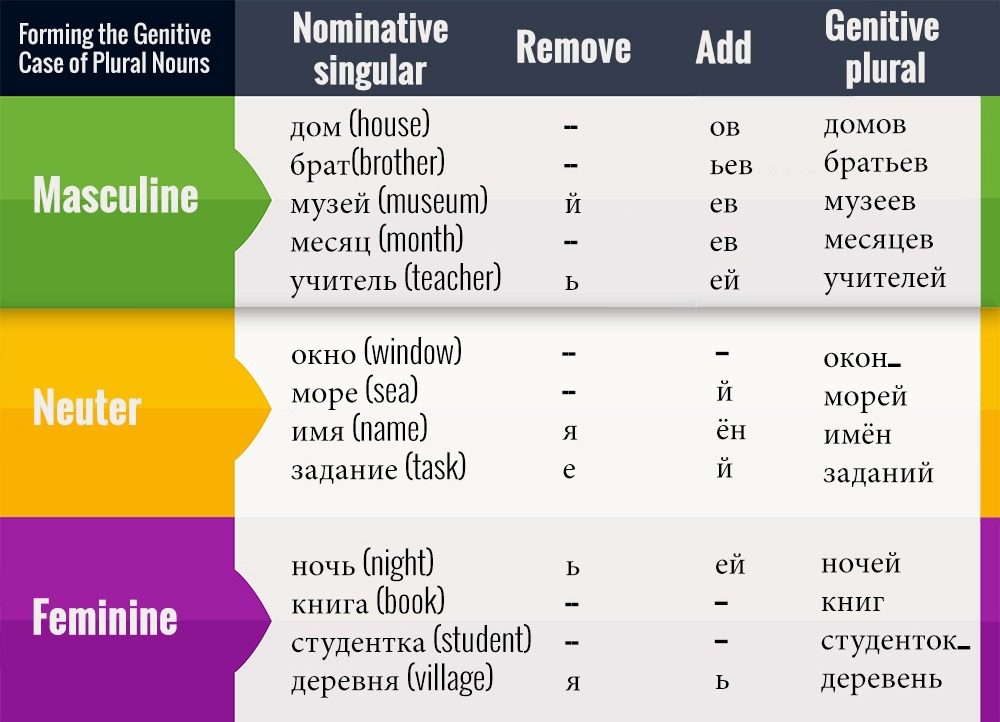
Conquering the Genitive Case in Russian LingQ Blog
Grammar 5—Russian Case Charts These charts show how the endings of Russian nouns, adjectives, and pronouns change according to their grammatical case. The grammatical case indicates the role which the thing named plays in the action described. First and Second Declension Nouns in the Singular First and Second Declension Nouns in the Plural

Learn the 6 Russian Cases Fast with this Proven System
In Russian, cases are realized by changing the ends of nouns and adjectives. For example, if we look at the Russian word for computer: It's компьютер ( komp'yuter) when it is the subject of a sentence: → The computer is broken. It's компьютера ( komp'yutera) when you're referring to a part of it: → The harddrive of the computer has been replaced.

падежи Declension chart Russian Language Stack Exchange
The primary use of the Russian genitive case is to show possession. In English we often indicate this with an apostrophe ('s), or the word "of". Grammatically, the definition of possession may be larger than we are used to thinking of in English. In Russian the possessor always follows the object it possess. (This is the reverse of the.

More Russian Case Charts....Russian grammar aaaah as the saying goes, "it will break your t
The case system in Russian does two things. First, it marks the grammatical functions of nouns which are indicated by word order in English, that is, the subject, object and indirect object of the sentence. (This means that these nouns are free to be ordered almost anywhere in the sentence since their function is clearly indicated by their form.)

ABC Russian Russian nouns and adjectives declensions in all cases.
The Cases of Russian Nouns In Russian language the nouns change their forms and get different endings. These forms (and their endings) are called cases. The case of a noun shows what role a noun plays in the sentence. Please note that the goal of this lesson is to introduce the cases of Russian nouns.
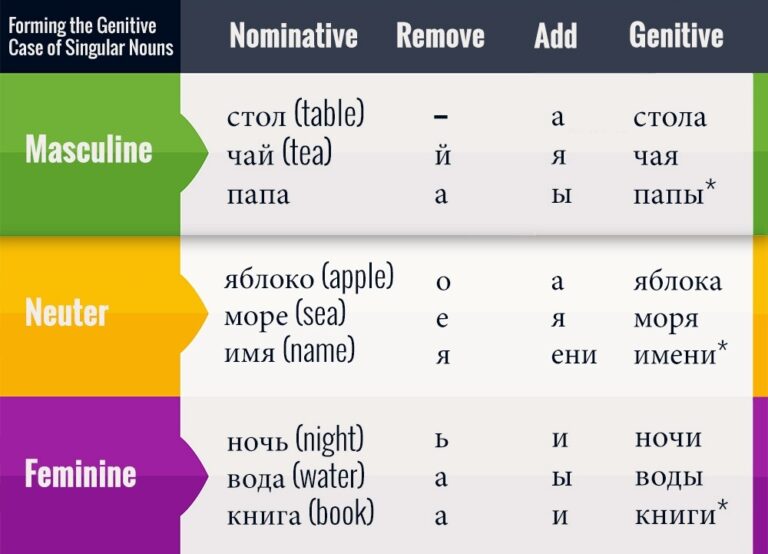
Conquering the Genitive Case in Russian LingQ Blog
The Nominative case can be thought of as the "Normal" case, the form in which all nouns are given in a Russian dictionary. In premise, this case identifies the subject of the sentence, without any additional meaning added to the noun. Example: Russian: мне нравится этот дом Pronunciation: [mne nravitsya etot dom] Translation: I like this house

Russian Cases in Simple Words (with visual sheets, charts, video) Russian language learning
The Russian case system essentially serves as the building blocks of the Russian language. Each case has specific functions, or uses, that dictate when to use them. Once you identify the appropriate case, based on what you're trying to express, you must change certain word endings accordingly.